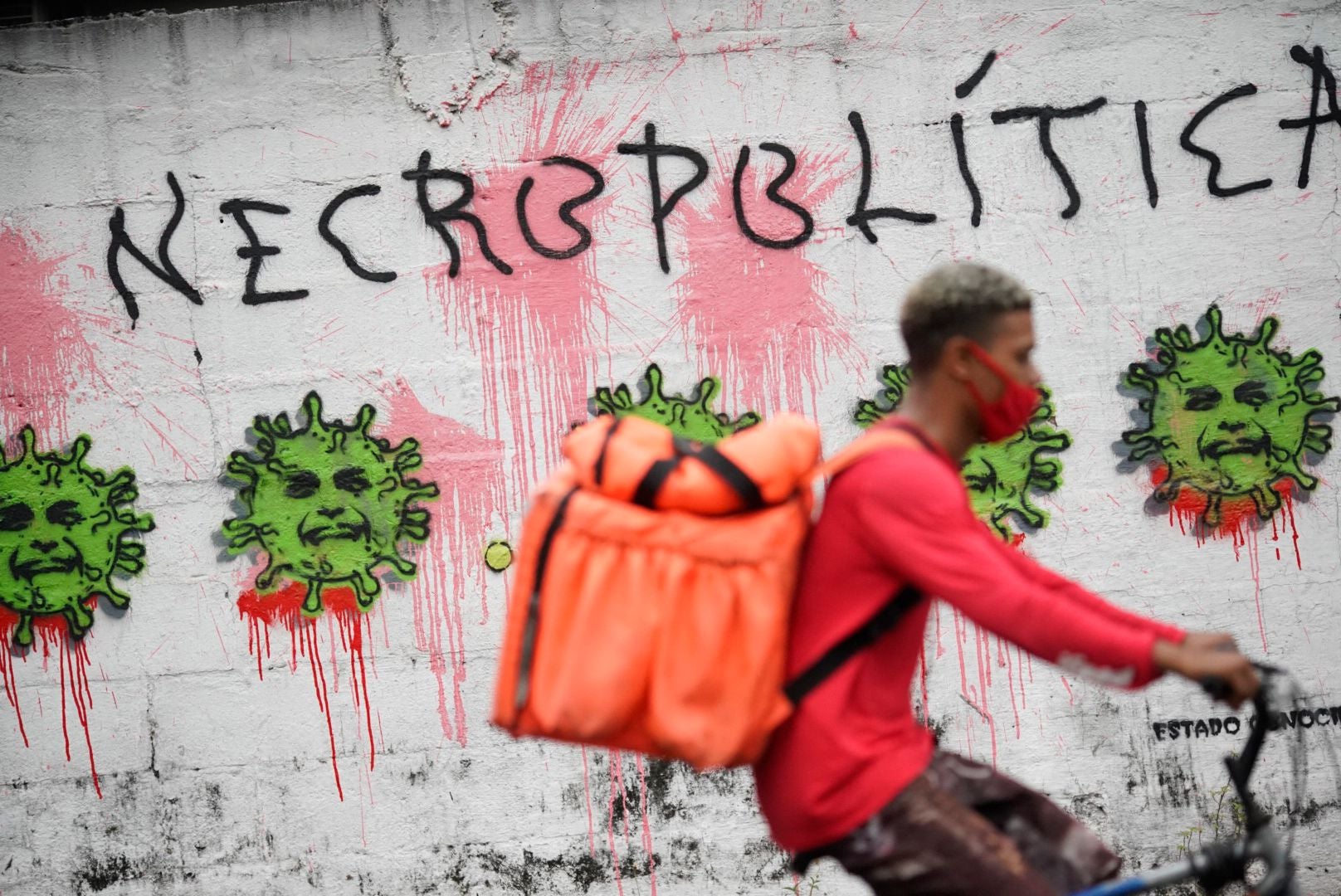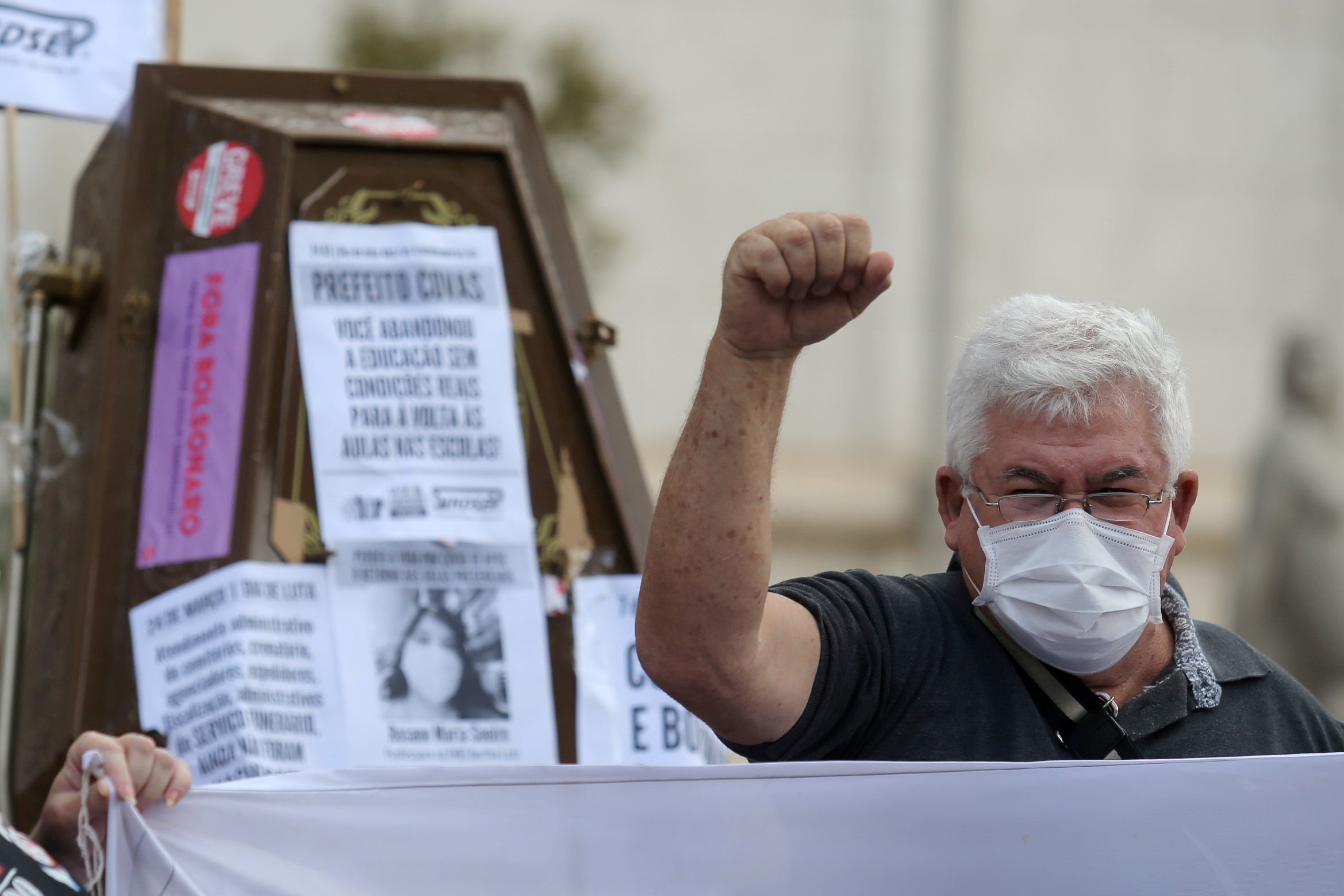‘The rich think they can buy what they want, even lives’: Anger over Brazil’s vaccination plan as Covid rages
A plan to involve the private sector in distributing much-needed vaccines has prompted anger, reports Charlotte Peet in Brazil

As Brazil grapples with its darkest health, political and moral crisis, the country’s most powerful businessmen are trying to revise a recent Brazilian law that would allow them preferential access to limited Covid-19 vaccine supplies.
On Tuesday this week, as the South American nation reported a single day record of almost 4,200 Covid-deaths, members of the Brazilian congress backed a bill that would enable companies to purchase vaccines from individual suppliers and offer them to their employees, even before health officials and at-risk groups had received their first dose.
Health officials expressed outrage that members of the lower house of congress were wasting time and energy disputing over requirements for corporations to purchase and distribute vaccines despite overflowing intensive care units in several states across the country on the brink of collapse.
“At the worst moment of the pandemic, congress is arguing over whether they should allow companies to purchase vaccines. It’s a level of insanity. It’s completely shameful”, says Ethel Maciel, a professor and epidemiologist at the Federal University of Espirito Santo.
As Brazil continues to set a series of grim records of cases and deaths, the country’s economic elite are urgently manoeuvring themselves to be ahead of the vaccine queue, in a country where the national vaccination rollout has been painfully slow. So far, Brazil has fully vaccinated just over eight per cent of its 212 million population.
In an effort to speed up the country’s vaccine rollout and boost Brazil’s economy, their congress approved a law last month authorising the private sector to purchase vaccines but outlined that all shots were to be donated to the Ministry of Health until priority groups are vaccinated. Brazil is still currently vaccinating people over 60.
On Wednesday, the speaker of the chamber, Arthur Lira defended increasing private participation of vaccines, suggesting that there would be no conflict of interest. “In war anything goes to save lives”, argues Lira.
Brazil was once known for a world-renowned immunisation programme for diseases such as measles, smallpox and tetanus, but many experts have blamed President Jair Bolsonaro for failing to acquire enough Covid doses, raising doubts about vaccines and downplaying the pandemic.
“This never happened in Brazil, the country always had a strong vaccination plan. What we are seeing are the consequences of Bolsonaro’s denialist government and the elite groups thinking they are above the rest,” explains Alexandre Padilha, a federal deputy and former Brazilian health minister from 2011-2014.

While question marks remain over how corporations will find vaccine suppliers given a global shortage of doses, experts have raised concerns over moral and health implications.
The purchase and distribution of vaccines within the private sector was originally justified for two reasons.
Firstly, corporations would be paying for the vaccines from their own pocket, alleviating some of the financial burden from the public health system. Then, after priority groups had been vaccinated, they would distribute half of their doses to the national vaccine plan, allowing for wider vaccine access to the country’s population.
However, changes now proposed would allow companies to bypass the requirement to donate any of their purchases to the public health system, instead being eligible to start vaccinating their employees and families immediately, without the approval of Brazil’s National Health Surveillance Agency, even before priority groups have been vaccinated.
The bill has the backing of the government and is expected to be approved.
Businessman Luciano Hang, who joined other corporate leaders in campaigning to amend the original Lira-backed bill, has argued that corporations could step in to speed up vaccination efforts in the country.
“The law needs to be changed. I trust that the market could really help resolve the country’s vaccine problem. Regrettably, once again public power is involved and gets in the way of the pandemic”, he says in an interview with local magazine, Gazeta do Povo.
But as the world faces global shortages, experts argue that the policy is deeply immoral, servicing only to deepen the rich and poor divide in one of the most unequal countries on earth.
Renato Janine Ribeiro, a professor of philosophy and ethics at the University of Sao Paulo and a former minister of education, says the government’s decision is gravely unethical. “You have a situation where lots of people are dying but Brazil’s rich are used to buying what they want. Even lives,” he says.
As Brazil’s crisis continues to deepen, Brazil’s business elite scolded Bolsonaro last month in an open letter, demanding he take tougher measures to speed up vaccinations. Without naming Bolsonaro, they attacked political leadership for refusing to implement national lockdowns and for “flirting with the anti-vaccine movement”.
Political scientists now say that Bolsonaro’s support base, including business leaders, are increasingly growing frustrated with a lack of vaccines and the president’s mishandling of the pandemic.
“Bolsonaro created this fake opposition that it’s the economy vs the disease. But people are now realising that you can’t handle one without the other’’, Rodrigo Armstrong, a political scientist from the FGV think tank in Rio de Janeiro explains.
Brazil’s catastrophic crisis has since encouraged Bolsonaro to somewhat change his tack. Last month, the president said 2021 will be “the year of the vaccines” and has even been spotted on the rare occasion wearing a mask.
Bolsonaro’s popularity has sunk over recent months while Brazil’s death toll continues to mount, hitting a record rejection rate of 59 per cent according to a poll by PoderData last week.
This reversal on his stance towards vaccines has led some to argue that his support for private vaccines could help tame a backlash from those frustrated about the lack of doses in the country, while also reinforcing Bolsonaro’s rhetoric that the Brazilian labour force should return to work immediately to kickstart the pandemic-battered economy.

But as experts fear that over 100,000 Brazilian lives could be lost in April, with Covid-19 disproportionately affecting the country’s poor, many businessmen are coming to terms with the fact that if the government had urgently pursued acquiring enough vaccines from the start, perhaps they’d still be in business.
For now though, many are having to confront the question posed by governor of Bahia, Rui Costa during a live interview with local news channel O Globo.
“What is more important: 48 hours of a store staying in business or human lives?” he asks through tears.
Join our commenting forum
Join thought-provoking conversations, follow other Independent readers and see their replies
Comments